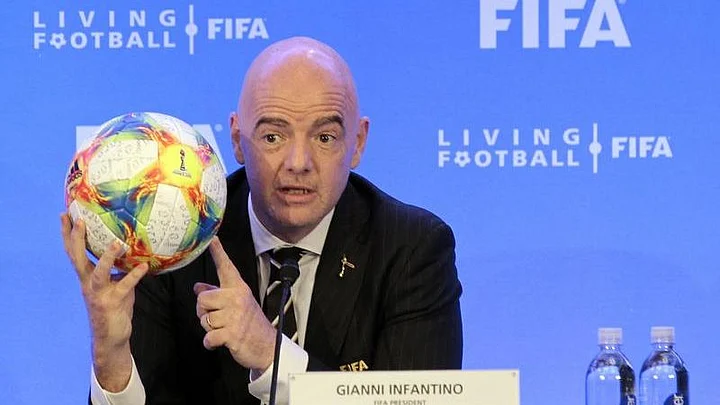FIFA announced on Friday that semi-automated offside technology (SAOT) will be used at the 2022 World Cup in Qatar to enable referees to make faster, more accurate offside decisions at the world's biggest football gala.
"At the FIFA World Cup in 2018, FIFA took the brave step to use Video Assistant Referee (VAR) technology. Semi-automated offside technology is an evolution of the VAR systems that have been implemented across the world," the world football governing body president Gianni Infantino noted, saying that SAOT will provide the very best for the teams, players and fans who will be heading to Qatar in November this year.
According to the FIFA statement, the SAOT system uses 12 dedicated tracking cameras mounted underneath the roof of the stadium to track the ball and up to 29 data points of each individual player, 50 times per second, calculating their exact position on the pitch, while the sensor positioned in centre of the tournament's official match ball "Al Rihla" sends data 500 times per second, allowing a very precise detection of the kick point.
The data collected by cameras and the ball sensor will be processed by artificial intelligence within a few seconds to check the offside situation. Once an offside position is detected, the SAOT system will provide an automated offside alert to the video match officials team, reports Xinhua.
After the decision has been confirmed by the VAR and the referee on the pitch, the SAOT will then generate a 3D animation to be displayed on the giant screens in the stadium and on TV, which gives the best possible perspectives for an offside situation.
FIFA Director of Football Technology & Innovation Johannes Holzmuller said that the new technology has been successfully trialed at numerous test events including the FIFA Arab Cup 2021 and the FIFA Club World Cup 2021.
"During the tests, the average VAR offside check time has reduced from 70 seconds to 25 seconds, and the 3D animation could improve a better communications with fans," he revealed in the online press conference.
"VAR has already had a very positive impact on football and we can see that the number of major mistakes has already been dramatically reduced. We expect that semi-automated offside technology can take us a step further. We will have a very valuable support tool to help referees and assistant referees make the best and most correct decision on the field of play," Pierluigi Collina, chairman of the FIFA Referees Committee, said of the technology.
Collina pointed out that the SAOT is still limited and noted that "the referees and the assistant referees are still responsible for the decision on the field of play," Collina added.
(At The Quint, we question everything. Play an active role in shaping our journalism by becoming a member today.)
